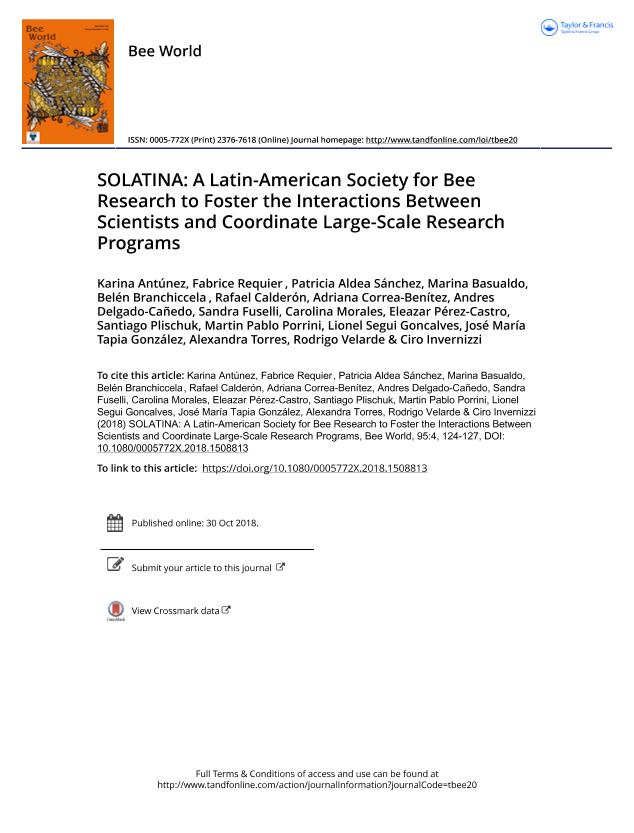Mostrar el registro sencillo del ítem
dc.contributor.author
Antúnez, Karina

dc.contributor.author
Requier, Fabrice

dc.contributor.author
Aldea Sánchez, Patricia

dc.contributor.author
Basualdo, Marina

dc.contributor.author
Branchiccella, Belén

dc.contributor.author
Calderón, Rafael
dc.contributor.author
Correa Benítez, Adriana
dc.contributor.author
Delgado Cañedo, Andres

dc.contributor.author
Fuselli, Sandra Rosa

dc.contributor.author
Morales, Carolina Laura

dc.contributor.author
Pérez Castro, Eleazar

dc.contributor.author
Plischuk, Santiago

dc.contributor.author
Porrini, Martín Pablo

dc.contributor.author
Segui Goncalves, Lionel
dc.contributor.author
Tapia González, José María
dc.contributor.author
Torres, Alejandra
dc.contributor.author
Velarde, Rodrigo
dc.contributor.author
Invernizzi, Ciro

dc.date.available
2019-08-09T14:44:09Z
dc.date.issued
2018-09
dc.identifier.citation
Antúnez, Karina; Requier, Fabrice; Aldea Sánchez, Patricia; Basualdo, Marina; Branchiccella, Belén; et al.; SOLATINA: a Latin-American Bee Research Association to foster the interactions between scientists and coordinate large-scale research programs; Taylor & Francis; Bee World; 95; 4; 9-2018; 124-127
dc.identifier.issn
0005-772X
dc.identifier.uri
http://hdl.handle.net/11336/81308
dc.description.abstract
Bees (members of the super family Apoidea) are the main pollinators in modern agro-ecosystems, where they have a critical positive effect on yield improvement for about 75% of world's crops (Klein et al., 2007; Potts et al., 2016). However, there is evidence of a worldwide decline in the populations of wild bees, and numerous reports of high colony losses of managed bees, which may disrupt crop pollination, honey production and the reproduction of bee-pollinated wild plants (Potts et al., 2010), leading to negative social, economic and ecological effects (Potts et al., 2016). Latin America (hereafter, LA) is home to about 8 million managed honey bee colonies (Apis mellifera L.) which produce more than 200000 tons of honey annually (FAOSTAT, 2018). Several Latin American countries are among the global top 20 in terms of honey production and beehives stock, such as Argentina, Brazil and Mexico (García, 2018; Requier et al., 2018). Moreover, LA hosts a unique fauna of native bees, with about 5,000 identified species, including 391 species of the native stingless bees in the tribu Meliponini (Camargo & Pedro, 2008; Freitas et al., 2009). Some of those native stingless bees are managed since ancient times to produce honey through the practice of “Meliponiculture” (Jaffé et al., 2015). Latin American bee research has contributed to improve our understanding of problems relevant for apiculture, bee diversity and the causes of bee population decline in the region among other topics (see e.g., Maggi et al., 2016; Morales, Arbetman, Cameron, & Aizen, 2013; Vandame & Palacio, 2010). These scientific achievements are mostly the result of research efforts led by groups working independently rather than the product of cooperative research efforts between different countries. We argue that the strength, impact, and relevance of these research efforts, for apiculture and bees in the region, can be improved by promoting interactions between Latin American bee scientists and coordinating large-scale research programs.
dc.format
application/pdf
dc.language.iso
eng
dc.publisher
Taylor & Francis

dc.rights
info:eu-repo/semantics/openAccess
dc.rights.uri
https://creativecommons.org/licenses/by-nc-sa/2.5/ar/
dc.subject
Solatina
dc.subject
Bees
dc.subject.classification
Zoología, Ornitología, Entomología, Etología

dc.subject.classification
Ciencias Biológicas

dc.subject.classification
CIENCIAS NATURALES Y EXACTAS

dc.title
SOLATINA: a Latin-American Bee Research Association to foster the interactions between scientists and coordinate large-scale research programs
dc.type
info:eu-repo/semantics/article
dc.type
info:ar-repo/semantics/artículo
dc.type
info:eu-repo/semantics/publishedVersion
dc.date.updated
2019-07-26T13:46:53Z
dc.journal.volume
95
dc.journal.number
4
dc.journal.pagination
124-127
dc.journal.pais
Reino Unido

dc.description.fil
Fil: Antúnez, Karina. Instituto de Investigaciones Biológicas "Clemente Estable"; Uruguay
dc.description.fil
Fil: Requier, Fabrice. Consejo Nacional de Investigaciones Científicas y Técnicas; Argentina. Universidad Nacional de Río Negro; Argentina
dc.description.fil
Fil: Aldea Sánchez, Patricia. Universidad Mayor; Chile
dc.description.fil
Fil: Basualdo, Marina. Universidad Nacional del Centro de la Provincia de Buenos Aires. Facultad de Ciencias Veterinarias. Departamento de Producción Animal; Argentina
dc.description.fil
Fil: Branchiccella, Belén. Instituto de Investigaciones Biológicas "Clemente Estable"; Uruguay
dc.description.fil
Fil: Calderón, Rafael. Universidad Nacional; Costa Rica
dc.description.fil
Fil: Correa Benítez, Adriana. Universidad Nacional Autónoma de México; México
dc.description.fil
Fil: Delgado Cañedo, Andres. Universidade Federal do Pampa; Brasil
dc.description.fil
Fil: Fuselli, Sandra Rosa. Universidad Nacional de Mar del Plata; Argentina. Consejo Nacional de Investigaciones Científicas y Técnicas; Argentina
dc.description.fil
Fil: Morales, Carolina Laura. Consejo Nacional de Investigaciones Científicas y Técnicas. Centro Científico Tecnológico Conicet - Patagonia Norte. Instituto de Investigaciones en Biodiversidad y Medioambiente. Universidad Nacional del Comahue. Centro Regional Universidad Bariloche. Instituto de Investigaciones en Biodiversidad y Medioambiente; Argentina
dc.description.fil
Fil: Pérez Castro, Eleazar. Universidad Nacional del Centro del Perú; Perú
dc.description.fil
Fil: Plischuk, Santiago. Consejo Nacional de Investigaciones Científicas y Técnicas. Centro Científico Tecnológico Conicet - La Plata. Centro de Estudios Parasitológicos y de Vectores. Universidad Nacional de La Plata. Facultad de Ciencias Naturales y Museo. Centro de Estudios Parasitológicos y de Vectores; Argentina
dc.description.fil
Fil: Porrini, Martín Pablo. Universidad Nacional de Mar del Plata; Argentina. Consejo Nacional de Investigaciones Científicas y Técnicas; Argentina
dc.description.fil
Fil: Segui Goncalves, Lionel. Universidad Federal Rural do Semiarido; Brasil
dc.description.fil
Fil: Tapia González, José María. Universidad de Guadalajara; México
dc.description.fil
Fil: Torres, Alejandra. Universidad de Pamplona; Colombia
dc.description.fil
Fil: Velarde, Rodrigo. Instituto Apícola Boliviano; Bolivia
dc.description.fil
Fil: Invernizzi, Ciro. Universidad de la República; Uruguay
dc.journal.title
Bee World

dc.relation.alternativeid
info:eu-repo/semantics/altIdentifier/url/https://www.tandfonline.com/doi/full/10.1080/0005772X.2018.1508813
dc.relation.alternativeid
info:eu-repo/semantics/altIdentifier/doi/http://dx.doi.org/10.1080/0005772X.2018.1508813
Archivos asociados
